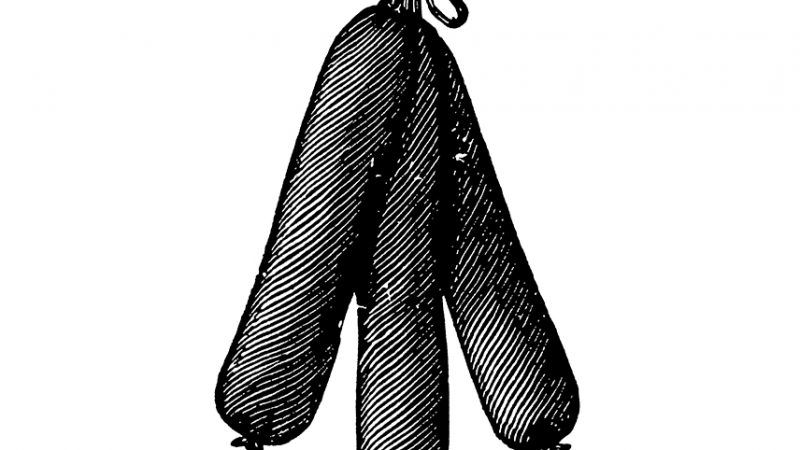Don't Let Uncle Sam Seize Your Salami
Civil import violations carry penalties tied to either the value of the article itself or to the taxes you would have been assessed if you'd declared it.

This article is part of Reason's special Burn After Reading issue, where we offer how-tos, personal stories, and guides for all kinds of activities that can and do happen at the borders of legally permissible behavior. Subscribe Now to get future issues of Reason magazine delivered to your mailbox!
You're on a plane, returning home from a romantic tour of the Italian countryside. The cabin lights flicker on and you're confronted by flight attendants passing out slips of official-looking blue cardstock: customs forms.
After scrounging a pen out of the bottom of your carry-on, you start to fill out the cramped response fields. Name, address, flight information. Back to the carry-on again, because who on Earth knows his own passport number? Finally, you come to the declaration section, and begin to tick off negative responses to the bizarre interrogatories. Bringing back soil? No. Seeds? No. Disease agents, cell cultures, or snails? No. Food or meat?
Your stomach drops as you remember the rustic charcuterie you purchased at a quaint butcher shop in Naples. Delicious, and not cheap, either. What to do? The once-boring form suddenly seems daunting. You're no scofflaw, but what will happen if you check "yes"? You don't want Uncle Sam to seize your salami. (That already happened once on this trip. Thanks, TSA.)
Subduing your law-abiding conscience, you cross your fingers, apologize to your divinity, and mark the box beside "no." OK, now what?
Probabilistically speaking, the answer is "likely nothing." Customs and Border Protection (CBP) doesn't usually conduct thorough searches of incoming commercial airline passenger baggage. Consequently, there's a decent chance your smuggled sausages slide through undiscovered.
But from a legal perspective, things look dicier. If you present your falsified form to a customs officer, you're technically in violation of a whole host of laws. And how costly is getting caught? Turns out it's hard to know. The applicable regulations are complex, numerous, redundant—and vague.
Say your goods are detected by one of CBP's trained food-sniffing dogs (yes, apparently the government believes dogs have to be trained to sniff out food). Depending on the stage of the inspection process, whether or not you've already handed over your form, what exactly the dog handler asks you, and what exactly you say, you could be guilty of import violations or criminal smuggling.
Civil import violations carry penalties tied to either the value of the article itself or to the taxes you would have been assessed if you'd declared it. In practice, criminal smuggling seems to be reserved for incidents involving drugs, but there's nothing in the law as written to prevent a prosecution for illicit meat.
At a minimum, you're likely guilty of "failure to declare," a catchall offense that seems to be popular among CBP officers who work in airports. Unlike the more technical importation violations, which apply only to taxable goods (a category for which your charcuterie is unlikely to qualify), you can be guilty of "failure to declare" even if the thing you're trying to bring in isn't subject to a tax, duty, or other restriction. Mere failure to disclose its presence is enough to create liability.
But depending what exactly your meat is made of, where it comes from, and whether any export-import treaties are applicable in its case, you may be breaking the law just by carrying it into the country. The relevant statute says the penalty for failing to declare a "controlled substance"—which in this case means anything that can't be legally imported, not just narcotics—is $500 or 10 times the value of the item, whichever is higher. If the item is not a controlled substance, you're still supposed to be assessed a fine equal to its value, plus any applicable taxes, plus a portion thereof again as yet another penalty.
But anecdotal evidence suggests that because of confusion around the rules, customs officers have a tremendous amount of discretion regarding how to handle violations. Anthony Bucci, a spokesman for CBP's New York field office, says that in the context of agriculture enforcement, whether a fine is imposed (and how steep it is) often comes down to whether an inspecting officer thinks the passenger has deliberately tried to pull a fast one on him.
"It's not a guarantee that the [failure to declare] fine will be assessed—it could be just a warning," he says. "The fine is more in the cases where the person is being dishonest, is not being truthful."
Online accounts from folks who report having been discovered transporting undeclared victuals variously report assessment of the full $500 levy, a lesser $300 levy, or no levy at all. A clip from a National Geographic television show about customs enforcement in New York City shows an airline passenger being fined $300 for a sandwich discovered in a carry-on bag he says his mother packed for him. On the eye-popping end of the spectrum, Columba Bush, wife of former Florida Gov. Jeb Bush, was reportedly fined $4,100 for failing to declare $19,000 in clothing and jewelry she bought on a trip to Paris in 1999.
If you are charged a penalty, good luck contesting it. On-the-spot fines imposed at the airport are generally not adjudicable, according to Bucci. "We have a cashier's window right inside our federal inspection site," he says. "If you have to pay a fine, you have to pay it right there.…The burden of admissibility into the United States is on the traveler. That traveler has to, for lack of a better word, prove their admissibility 100 percent."
Don't forget to check out the rest of Reason's Burn After Reading content.
This article originally appeared in print under the headline "Don't Let Uncle Sam Seize Your Salami."


Show Comments (43)